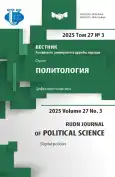Harnessing Artificial Intelligence in Electoral Processes: Emerging Opportunities and Innovations
- Authors: Baranov N.A.1,2
-
Affiliations:
- Russian Presidential Academy of National Economy and Public Administration
- Russian State University for the Humanities
- Issue: Vol 27, No 3 (2025): Digital policies
- Pages: 606-621
- Section: ARTIFICIAL INTELLEGENCE
- URL: https://journal-vniispk.ru/2313-1438/article/view/348839
- DOI: https://doi.org/10.22363/2313-1438-2025-27-3-606-621
- EDN: https://elibrary.ru/LRZUBZ
- ID: 348839
Cite item
Full Text
Abstract
The rapid development of technologies is an occasion to reflect on their capabilities in various fields, including political, related to electoral processes. Since the election of authorities is the most important task of legitimizing it, therefore, the question of the impact of artificial intelligence (AI) technologies on this important field of activity becomes relevant. The purpose of the work is to characterize innovations and identify opportunities for the use of artificial intelligence in the electoral process. The source of the article was the results of an expert survey, a distinctive feature of which is the comparison of the results of a survey of experts - leading domestic researchers in the field of electoral processes - with the position of the NicbarBot chatbot. The method of collecting information during an expert survey is an unstandardized interview, the method of processing the obtained primary data is discourse analysis. On the part of artificial intelligence, the theoretical elaboration of questions, algorithmization of responses, political neutrality, and a focus on achieving positive results of electoral innovations were revealed. Unlike AI, experts measure their answers against the real political situation, society’s willingness to innovate, sometimes there is an ideological context in the answers and there is no idealized optimistic idea of possible positive changes that electoral innovations can bring. The conclusion is made about the ambivalence of AI, which is associated both with the performance of useful functions in the electoral process and with a danger to society, because a person has not yet learned to control it. The possibilities of AI in the electoral process are associated with a variety of activities during the preparation, conduct of elections and counting of votes, as well as in the activities of election management bodies. Artificial intelligence is becoming a trigger for electoral innovations, the focus of which depends on the developers and participants of the electoral process.
About the authors
Nikolay A. Baranov
Russian Presidential Academy of National Economy and Public Administration; Russian State University for the Humanities
Author for correspondence.
Email: nicbar@mail.ru
ORCID iD: 0000-0003-3547-3644
Doctor of Political Sciences, Professor, Professor of the Department of International Relations, Northwest Institute of Management - Branch of the Russian Presidential Academy of National Economy and Public Administration; Leading Researcher, Russian State University for the Humanities
St. Petersburg, Russian Federation; Moscow, Russian FederationReferences
- Dudnik, D.O., & Balayan, E.Y. (2023). The use of artificial intelligence technologies in the electoral process. In Trends in the development of legal science at the present stage. Proceedings of the VI All-Russian Scientific and Practical Conference with international participation, Kemerovo, May 12–13, 2023. (pp. 66–73). Moscow: RG-Press. (In Russian). EDN: EENPNE
- Frolova, T.Y. (2023). Implementation of electoral rights using artificial intelligence in the Russian Federation. Science. Education. Modernity, 2, 77–80. (In Russian). https://doi.org/10.23672/SEM.2023.41.48.011 EDN: OEJDEW
- Gainetdinova, G.S., & Plyasunova, E.S. (2022). Application of artificial intelligence technologies in the electoral process: prospects and risks. In Traditions and innovations in the field of realization of the electoral rights of citizens of the Russian Federation. Collection of materials of the National Scientific and Practical Conference, Cheboksary, July 27, 2022. (pp. 85–89). Cheboksary: I.N. Ulyanov Chuvash State University. (In Russian). EDN: UHWPSZ
- Glazyev, S.Yu. (2021). Beyond the horizon of the end of history. Monograph. Moscow: Prospect. 638 p. (In Russian). EDN: UJOQSH
- Grishin, N.V. (2024). The study of innovations in state electoral policy: a review of scientific literature. Bulletin of the Perm University. Political science, 18, 2, 149–159. (In Russian). https://doi.org/10.17072/2218-1067-2024-2-149-159 EDN: OSOZCI
- Gundarin, M.V., & Oleshko, P.A. (2023). The use of artificial intelligence in election campaigns. PR and advertising in a changing world: the regional aspect, 28, 57–66. (In Russian). EDN: HBUWQJ
- Kilyachkov, A.A., Chaldaeva, L.A., Korolev, D.A., & Bayer, A.V. (2021). The use of artificial intelligence to identify signs of fraudulent actions during elections. Vlast’, 29, 5, 128–132. (In Russian). https://doi.org/10.31171/vlast.v29i5.8546 EDN: UPKJEY
- Kolyushin, E.I. (2021). Innovative technologies of the electoral process in the light of the rule of law. Justice, 3, 124–150. (In Russian). https://doi.org/10.37399/2686-9241.2021.3.124-150 EDN: RLJRTY
- Prathm, J. (2024). Artificial intelligence for electoral management. Stockholm: International IDEA, 67 p.
- Schwab, K. (2016). The Fourth Industrial Revolution. Moscow: Eksmo, 138 p. (In Russian). EDN: VUJSVF
- Sobyanin, A.V. (2022). Artificial intelligence in the electoral system: domestic and foreign experience. Trends in the development of science and education, 88–4, 61–65. (In Russian). https://doi.org/10.18411/trnio-08-2022-155 EDN: ZDFXXO
- Tertyshny, V.A. (2024). Integration of artificial intelligence into the electoral process as a global trend: Legal aspect. Intellectual resources for regional development, 1, 154–160. (In Russian). EDN: BGHTMQ
- Titov, A.K. (2023). The use of artificial intelligence in election campaigns. Alley of Science, 2, 12(87), 88–92. (In Russian). EDN: QKUWYB
- Ustinovich, E.S. (2024). Generative artificial intelligence in the electoral processes of 2024 in the world: disinformation campaigns and online trolls. Social Policy and Social Partnership, 3, 197–204. (In Russian). https://doi.org/10.33920/pol-01-2403-03 EDN: QUINRG
- Vasiliev, A.A., & Pechatnova, Yu.V. (2020). Artificial intelligence and law: Problems prospects. Russian Asian Legal Journal, 2, 14–18. (In, Russian). https://doi.org/10.14258/ralj EDN: YPVKSD
- Zakharova, V.I. (2021). An innovative course for the development of the electoral process in Russia in the context of digitalization. Citizen. Elections. Power, 4(22), 103–111. (In Russian). EDN: EAVLPY
Supplementary files









